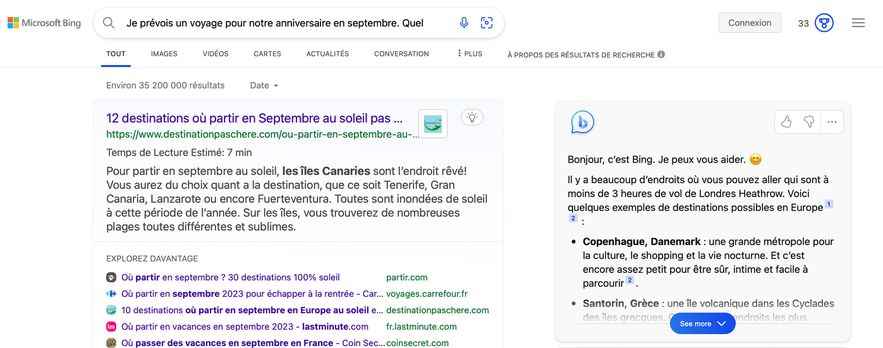Gateway to the web for more than twenty years, Internet research (or search) makes its revolution. Microsoft presented Tuesday, February 7 the brand new version of its search engine, Bing. An update far from trivial. Firstly because it embeds a powerful artificial intelligence (AI) solution, called Prometheus, designed with its partner OpenAI, the creator of ChatGPT. Then because this announcement comes the day after those of its competitor Google. The Mountain View firm has also launched its own AI-based conversational agent, Bard, which it also intends to integrate into its famous search engine. “The race starts today,” summarized Satya Nadella, the boss of Microsoft.
On paper, this battle seems unbalanced. Globally, Google captures almost 93% of the market according to Statcounter and therefore remains the leader in the online advertising market. Bing, in second place, owns just 3%. But the challenger puts forward some arguments to rebalance the balance. For Microsoft, its AI will allow “the biggest leap in relevance for two decades”. And thus fulfill real needs. “There are 10 billion search queries a day, but we estimate that half of them go unanswered. That’s because people are using search to do things it wasn’t designed to do. It’s great for finding a website, but for more complex questions or tasks, too often it’s not up to snuff,” the company continues.
In this context, the company founded by Bill Gates is betting on XXL queries: it will be possible to type a request of 1000 words. The answers will be both more personalized and more reliable, promises the firm. Microsoft wishes on this point to stand out from ChatGPT, whose image is somewhat tarnished by the mediocrity of certain answers (when they are not quite simply outdated). A set to the right of the user’s screen will give the best answer according to Bing. A series of classic links will always be available on the left side.
MR
© / MR
“Copilot”
The other star feature of the new Bing will rely on the conversational power of its AI model. Just like ChatGPT, the idea is to obtain, through a series of questions or remarks, advice of all kinds: an idea for a logo for your company, a sports program adapted to your physical condition or the menu of a complete dinner for six people according to their tastes and allergies. A real “co-pilot” underlined the vice-president of Microsoft, Yusuf Mehdi. At the bottom of each answer, the links on which the AI was based will be displayed. The bet remains risky. “Use your own opinion and check facts before making decisions or taking action based on Bing’s responses,” the company warns.
The new Bing will be launched in the coming weeks. It is already possible to register on a waiting list in order to test this AI-powered search engine as a priority. Microsoft does not hide it: the next step is now to infuse AI in all its areas. Its cloud, its Office office suite, its software dedicated to work, Teams (already equipped with a functionality with ChatGPT) and of course its Edge browser, which also suffers from a severe delay on its competitors Chrome (Google) and Firefox . An extensive facelift is underway, with the addition of features from cat by AI, and a tool for composing emails and LinkedIn posts (also owned by Microsoft). A way of remembering that AI will be part of all future technological battles.
